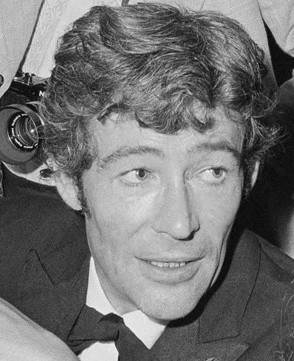
Peter Seamus O'Toole was an English stage and film actor. He attended RADA and began working in the theatre, gaining recognition as a Shakespearean actor at the Bristol Old Vic and with the English Stage Company. In 1959 he made his West End debut in The Long and the Short and the Tall, and played the title role in Hamlet in the National Theatre's first production in 1963. Excelling on the London stage, O'Toole was known for his "hellraiser" lifestyle off it.

Karen Blanche Black was an American actress, screenwriter, singer, and songwriter. She rose to prominence for her work in various studio and independent films in the 1970s, frequently portraying eccentric and offbeat characters, and established herself as a figure of New Hollywood. Her career spanned over 50 years and includes nearly 200 credits in both independent and mainstream films. Black received numerous accolades throughout her career, including two Golden Globe Awards, as well as an Academy Award nomination for Best Supporting Actress.

Susannah Yolande Fletcher, known professionally as Susannah York, was an English actress. Her appearances in various films of the 1960s, including Tom Jones (1963) and They Shoot Horses, Don't They? (1969), formed the basis of her international reputation. An obituary in The Telegraph characterised her as "the blue-eyed English rose with the china-white skin and cupid lips who epitomised the sensuality of the swinging sixties", who later "proved that she was a real actor of extraordinary emotional range".
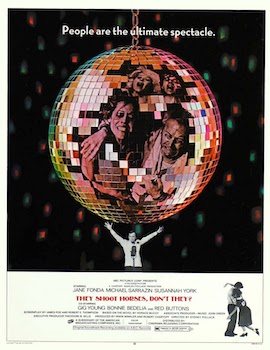
They Shoot Horses, Don't They? is a 1969 American psychological drama film directed by Sydney Pollack, from a screenplay written by Robert E. Thompson and James Poe, based on Horace McCoy's 1935 novel of the same name. It stars Jane Fonda, Michael Sarrazin, Susannah York, Gig Young, Bonnie Bedelia, and Red Buttons. It focuses on a disparate group of individuals desperate to win a Depression-era dance marathon and an opportunistic emcee who urges them on.

Elliott Gould is an American actor. In a career spanning over seven decades, he began acting in Hollywood films during the 1960s.
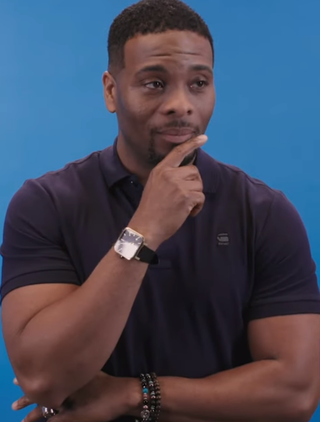
Kel Johari Rice Mitchell is an American actor, comedian, pastor, singer, and TV host. He was an original cast member of the Nickelodeon sketch comedy series All That for its first five seasons (1994–1999), where he was often paired with Kenan Thompson. His role as Ed in the All That sketch was reprised for the 1997 teen comedy film loosely based on the series, Good Burger. He co-starred with Thompson on the Nickelodeon sitcom Kenan & Kel from 1996 to 2000. Mitchell received two Emmy Award nominations for Outstanding Performer in an Animated Program for his role as "T-Bone" in the children's animated series Clifford the Big Red Dog (2000–2003). From 2015 to 2019, he starred as "Double G" on the Nickelodeon sitcom Game Shakers.

Rupert Holmes, is a British-American composer, singer-songwriter, dramatist and author. He is widely known for the hit singles "Escape " (1979) and "Him" (1980). He is also known for his musicals The Mystery of Edwin Drood, which earned him two Tony Awards, and Curtains, and for his television series Remember WENN.

Murphy's War is an Eastmancolor 1971 Panavision war film starring Peter O'Toole and Siân Phillips. It was directed by Peter Yates based on the 1969 novel by Max Catto. The film's cinematographer was Douglas Slocombe.

Richard Samuel Benjamin is an American actor and film director. He has starred in a number of well-known films, including Goodbye, Columbus (1969), Catch-22 (1970), Portnoy's Complaint (1972), Westworld (1973), The Last of Sheila (1973), and The Sunshine Boys (1975), for which he won a Golden Globe Award for Best Supporting Actor – Motion Picture. Benjamin was nominated for an Emmy Award for Best Actor in a Comedy Series for his performances in He & She (1968), opposite his wife Paula Prentiss.

John Lee Thompson was an English film director, screenwriter and producer. Initially an exponent of kitchen sink realism, he became known as a versatile and prolific director of thrillers, action, and adventure films.
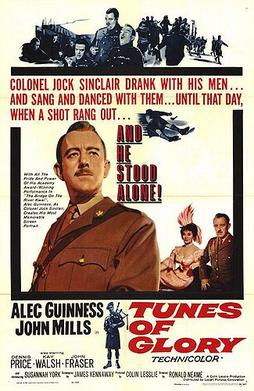
Tunes of Glory is a 1960 British drama film directed by Ronald Neame, starring Alec Guinness and John Mills, featuring Dennis Price, Kay Walsh, John Fraser, Duncan MacRae, Gordon Jackson and Susannah York. It is based on the 1956 novel and screenplay by James Kennaway. The film is a psychological drama focusing on events in a wintry Scottish Highland regimental barracks in the period immediately following the Second World War. Writer Kennaway served with the Gordon Highlanders, and the title refers to the bagpiping that accompanies every important action of the battalion.

Peter James Yates was an English film director and producer, known for his versatility and “attention to detail” across a variety of genres. He received nominations for four Academy Awards, three BAFTA Awards, and two Golden Globe Awards.

Peter Collinson was a British film director probably best remembered for directing The Italian Job (1969).
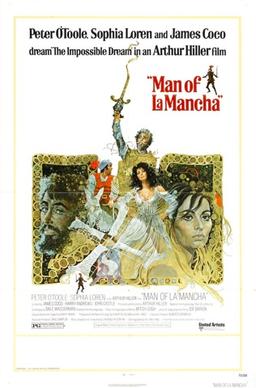
Man of La Mancha is a 1972 film adaptation of the Broadway musical Man of La Mancha by Dale Wasserman, with music by Mitch Leigh and lyrics by Joe Darion. The musical was suggested by the classic novel Don Quixote by Miguel de Cervantes, but more directly based on Wasserman's 1959 non-musical television play I, Don Quixote, which combines a semi-fictional episode from the life of Cervantes with scenes from his novel.
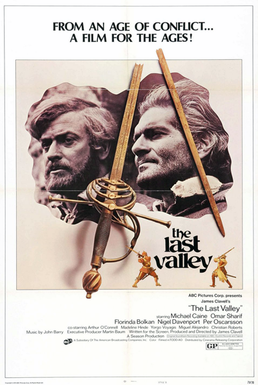
The Last Valley is a 1971 film written and directed by James Clavell, an historical drama set during the Thirty Years' War (1618–1648). While war ravages southern Germany, a mercenary leader and a teacher stumble upon a valley untouched by the war. Based upon the novel The Last Valley (1959), by J. B. Pick, the cinematic version of The Last Valley was the final feature film photographed with the Todd-AO 70 mm widescreen process until it was revived to make the film Baraka in 1991.

John Goldfarb, Please Come Home! is a 1965 American comedy film based on the novel by William Peter Blatty published in 1963. The film was directed by J. Lee Thompson. The film was shot in the Mojave Desert.
James Peeble Ewing Kennaway was a Scottish novelist and screenwriter. He was born in Auchterarder in Perthshire and attended Glenalmond College.

Scream and Scream Again is a 1970 British horror film starring Vincent Price, Christopher Lee, Alfred Marks, Michael Gothard, and Peter Cushing. It is based on the novel The Disorientated Man (1967) attributed to 'Peter Saxon', a house pseudonym used by various authors in the 1960s and 1970s.
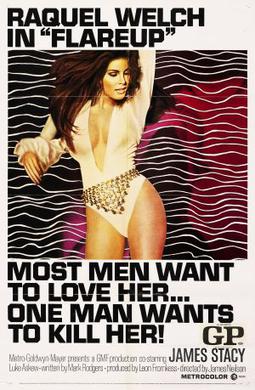
Flareup is a 1969 American thriller film directed by James Neilson and written by Mark Rodgers. The film stars Raquel Welch, James Stacy, Luke Askew, Don Chastain, Ron Rifkin and Jean Byron. The film was released on November 10, 1969, by Metro-Goldwyn-Mayer.

Household Ghosts is a 1961 novel by the British writer James Kennaway. It portrays the intense relationship between a brother and sister, members of a declining upper-class family in rural Perthshire.


















